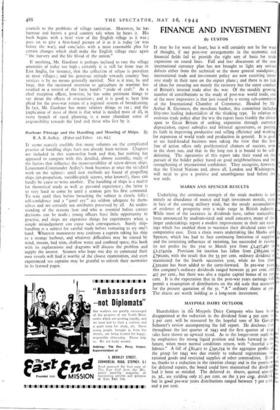FINANCE AND INVESTMENT
By CUSTOS
IT may be for want of heart, but it will certainly not be for want of thought, if our post-war arrangements in the economic and financial fields fail to provide the right sort of basis for trade expansion on sound lines. Full and free discussion of the -new international currency plan has not brought to light any serious defects either from the technical or the more general standpoint ; international trade and investment policy are now receiving inten- sive study in their turn on the expert plane ; and there is no lack of ideas for ensuring not merely the recovery but the saner conduct of Britain's internal trade after the war. Of the steadily growing number of contributions to the study of post-war world trade, one of the most impressive is that just issued by a strong sub-committee of the International Chamber of Commerce. Headed by Mr. Arthur R. Guinness, the merchant banker, this committee includes fifty-two leading industrialists of the thinking type. In relation to overseas trade policy after the war the report faces frankly the choice open to Great Britain of seeking expansion through currency depreciation, export subsidies and bilateral agreements, or putting its faith in improving productive and selling efficiency and working for expansion of world trade and production in general. It is good to see hard-headed business men taking the view that the first line of action offers only problematical chances of success, even in the short run, and that in the long run it is bound to be self- defeating. The signatories of this report take their stand on the pursuit of the bolder policy based on good neighbourliness and the strengthening of international confidence. They recognise, however, that the United Nations and, above all, London and Washington, will need to give a positive and unambiguous lead before the war ends.
St
MARKS AND SPENCER RESULTS
Underlying the continued strength of the stogk markets is not merely an abundance of money and high investment morale, even in face of the coming military trials, but the steady accumulation of evidence of prosperity over a wide range in British industry. While most of the increases in dividends have, rather noticeably, been announced by medium-sized and small concerns; many of the larger undertakings report a modest improvement in their net earn- ings which has enabled them to maintain their dividend rates with comparative ease. Even a chain stores undertaking like Marks and Spencer, which has had to face continuing limitation of supplies and the restricting influences of rationing, has succeeded in raising its net profits foe the year to March 31st from £1,457,467 to £1,574,029. Provision for taxation has fallen from £863,000 to £790,000, with the result that the 35 per cent. ordinary dividend is maintained for the fourth spccessive year, while no less than £320,000 has been added to the carry-forward. In pre-war yeah this company's ordinary dividends ranged between 35 per cent. and 42f per cent., but there was also a regular capital bonus of to per cent. It is the expectation that in the post-war years earnings will permit a resumption of distributions on the old scale that accounts for the present quotation of the 5s. "A" ordinary shares at 595. The. shares are worth holding as a long-term investment.
MAYPOLE DAIRY OUTLOOK
Shareholders in the Maypole Dairy Company who have been disappointed at the reduction in the dividend from 4 per cent. to 3 per cent. will be reassured by the hopeful tone of Sir George Schuster's review accompanying the full report. He discloses that throughout the last quarter of 1943 and the first quarter of 1944 sales have shown an upward trend. As to the longer-term outic.sIc he emphasises the strong liquid position and looks forward to the future, when more normal conditions return, with " cheerful con- fidence." A fall of £82,412 to £341,254 in the aggregate profits of the group for 1943 was due mainly to reduced registrations for o- rationed goods and restricted supplies of other commodities. Even ( so, thanks to a reduction in the taxation charge and in the provisiall for deferred repairs, the board could have maintained the dividend had it been so minded. The deferred 2s. shares, quoted around 2s. 3d., are yielding only 2,1. per cent. on the 3 per emit dividend, but in good pre-war years distributions ranged between 7 per cent. and 9 per cent.
r.
0
it
y.
fa
cc m of a
S
rr
n h
0
Cr S.
It
us


























 Previous page
Previous page